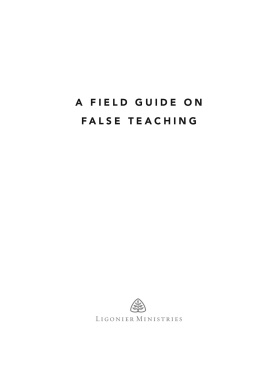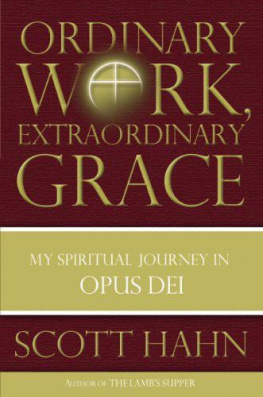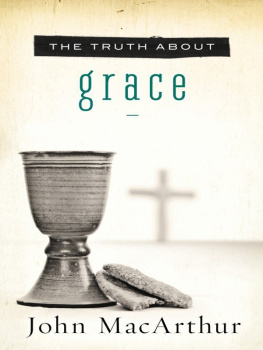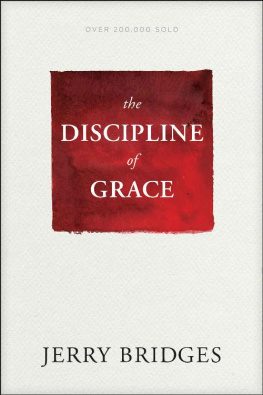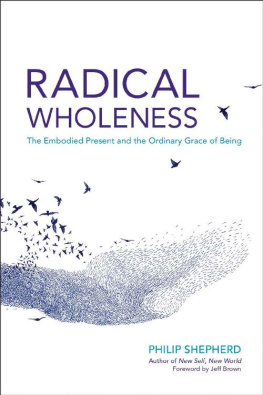Ligonier - The Ordinary Means of Grace
Here you can read online Ligonier - The Ordinary Means of Grace full text of the book (entire story) in english for free. Download pdf and epub, get meaning, cover and reviews about this ebook. year: 2020, publisher: Ligonier Ministries, genre: Religion. Description of the work, (preface) as well as reviews are available. Best literature library LitArk.com created for fans of good reading and offers a wide selection of genres:
Romance novel
Science fiction
Adventure
Detective
Science
History
Home and family
Prose
Art
Politics
Computer
Non-fiction
Religion
Business
Children
Humor
Choose a favorite category and find really read worthwhile books. Enjoy immersion in the world of imagination, feel the emotions of the characters or learn something new for yourself, make an fascinating discovery.
The Ordinary Means of Grace: summary, description and annotation
We offer to read an annotation, description, summary or preface (depends on what the author of the book "The Ordinary Means of Grace" wrote himself). If you haven't found the necessary information about the book — write in the comments, we will try to find it.
The Ordinary Means of Grace — read online for free the complete book (whole text) full work
Below is the text of the book, divided by pages. System saving the place of the last page read, allows you to conveniently read the book "The Ordinary Means of Grace" online for free, without having to search again every time where you left off. Put a bookmark, and you can go to the page where you finished reading at any time.
Font size:
Interval:
Bookmark:

I HAVE NEVER HEARD a Christian say he does not believe that God is sovereign. But I have heard many professing Christians define the sovereignty of God in a way that ultimately makes man sovereign over God. It is a view of sovereignty where man is big and God is small. People will say, I know God is sovereign, but... Truthfully, many professing Christians dont actually believe that God is sovereign. And if we dont believe that God is sovereign, we dont actually believe that God is God. Yet, the problem goes much deeper than that.
Many Christians who profess to believe that God is sovereign over all believe in a sort of sovereignty that is more akin to Islamic determinism than biblical theism, a sort of theistic nihilism that believes nothing we do really mattersthat God is sovereign and we are mere puppets on a string. That is not the biblical teaching on the sovereignty of God. He reveals in Scripture that He is indeed sovereign over all things, that He has foreordained all things that come to pass, and that He is neither the author nor approver of sin (Isa. 46:10; James 1:13; Westminster Confession of Faith 3.1). He reveals that He is sovereign over all and that we are culpable for our actions (Acts 2:23). He discloses that He is the primary cause and that He uses secondary causessuch as usto bring about His ultimate ends (Prov. 16:33; John 19:11). He reveals that while He has ordained the ends of all things, He has also ordained the means to all ends (Acts 4:2728).
When it comes to our worship of God, too many Christians think that it doesnt really matter what we do or how we do it because our sovereign God can use any means to accomplish His ultimate purposes. That, however, does not justify our using means that God has not given us. Nevertheless, many Christians and many churches believe that we may use whatever cleverly devised means we invent to bring about our desired ends.
If we actually believe God is sovereign, we must trust His sovereignly appointed means to bring about His desired ends. The means that God has appointed for our spiritual nourishment and growth in grace are what we call the ordinary means of gracenamely, the Word, prayer, the sacraments of baptism and the Lords Supper, and, necessarily joined to these, the churchs discipline and care of souls. These means are appointed by God, are empowered by the Holy Spirit, and point us to Christ, and they sustain us and nourish us in our union with Christ as we rest in the sovereign ends of our triune God. 
___________________________________
DR. BURK PARSONSis editor of Tabletalk magazine and serves as senior pastor of Saint Andrews Chapel in Sanford, Fla. He is author of Why Do We Have Creeds? He is on Twitter at @BurkParsons.
___________________________________
 | Tabletalk (USPS 009-013) is published monthly by Ligonier Ministries, Inc., 421 Ligonier Court, Sanford, FL 32771. Annual subscription price (12 issues): $23.00. Periodicals postage paid at Lake Mary, FL, and additional mailing offices. The daily Bible studies are copyright 2014, Ligonier Ministries, Inc. Unless noted, all Scripture quotations are from The Holy Bible, English Standard Version. Copyright 2001 by Crossway Bibles, a division of Good News Publishers. Used by permission. All rights reserved. Postmaster: Send address changes to Ligonier Ministries, 421 Ligonier Court, Sanford, FL 32771. |

JUNE 2020 DAILY BIBLE STUDIES


THE PERFECT SACRIFICE OF CHRIST
P ERISHABLE foods such as dairy and meats often have an expiration date. These dates are based on how long the food will be safe to eat, such that to consume one of these foods after its expiration is to risk illness. Once these foods have expired, they are no longer fit for use.
With respect to the relationship between God and His people, the old covenant likewise had an expiration date. Once the Messiah came, the old covenant and its associated rituals would no longer be fit for Gods people. As we will see this month, the old covenant system expired with the work of Christ.
Our daily studies will cover Hebrews 8:110:18, which contains detailed teaching on the superiority of the new covenant, the inadequacy of the old covenant, and the perfect sacrifice of Jesus on the cross. We will consider the inauguration of the new covenant, the necessity of atonement, and many other topics.
Scriptures teaching on the atonement goes beyond what is found in Hebrews. Dr. R.C. Sprouls teaching series The Cross of Christ will help us better understand what the Bible says about Jesus and His effectual, atoning work. 
THROUGH CHRISTS SACRIFICE THE CHURCH WAS PERFECTLY SANCTIFIED, SO THERE IS NO NEED FOR THE SACRIFICE TO BE REPEATED.
John Owen, from his commentary on Hebrews 10:10
________________________________________________
ABIDING IN THE WORD
These verses parallel the themes of the studies each week. We encourage you to hide them in your heart so that you may not sin against the Lord:
Week of June 7 ...................................... ISAIAH 2:4
Week of June 14 .............................. HEBREWS 10:4
Week of June 21 ...................................PSALM 2:12
Week of June 28 ................................... MATTHEW 20:28

JOHN D. CURRID
________________________________________
I N THE WINTER OF 1947, a Bedouin shepherd named Muhammed edh-Dhib stumbled across a cave on the west side of the Dead Sea. In this cave (later called Qumran Cave 1), he discovered some scrolls, and seven of them were almost complete. The Bedouin desired to sell the scrolls, and they used an antiques dealer in the town of Bethlehem. A Syrian Orthodox monastery purchased four of the scrolls, and E.L. Sukenik bought the other three. Sukenik was an Israeli archaeologist who was one of the founding members of the archaeology department at Hebrew University in Jerusalem. Over the next few years, numerous manuscripts were found in other caves in the area. Excavation work in the caves began in early 1949 under the direction of G. Lankester Harding and Roland de Vaux (in Cave 1), and it continued throughout most of the 1950s.
In late 1950, de Vaux and Harding also began digging at the site of Qumran that was located on the west side of the Dead Sea near the caves. They believed that Qumran was home base for a group of Jews called Essenes. During the second to first centuries BC, a small group of Jews had broken from the priesthood in Jerusalem because the latter had secularized. Both Josephus and Philo put the number of Essenes at four thousand. A small group of them withdrew to the desert to prepare the way for God (based on Isa. 40:3), and they founded the desert community at Qumran under the leadership of the Teacher of Righteousness. They set themselves up as the true Israel and bound themselves by a new covenant that they believed would help bring in a theocratic kingdom. Most scholars believe that it was this group of Essenes that wrote and copied the Dead Sea Scrolls hidden in the caves near Qumran. (Some other scholars think the group at Qumran was not Essene but rather a different splinter group.)
Next pageFont size:
Interval:
Bookmark:
Similar books «The Ordinary Means of Grace»
Look at similar books to The Ordinary Means of Grace. We have selected literature similar in name and meaning in the hope of providing readers with more options to find new, interesting, not yet read works.
Discussion, reviews of the book The Ordinary Means of Grace and just readers' own opinions. Leave your comments, write what you think about the work, its meaning or the main characters. Specify what exactly you liked and what you didn't like, and why you think so.


